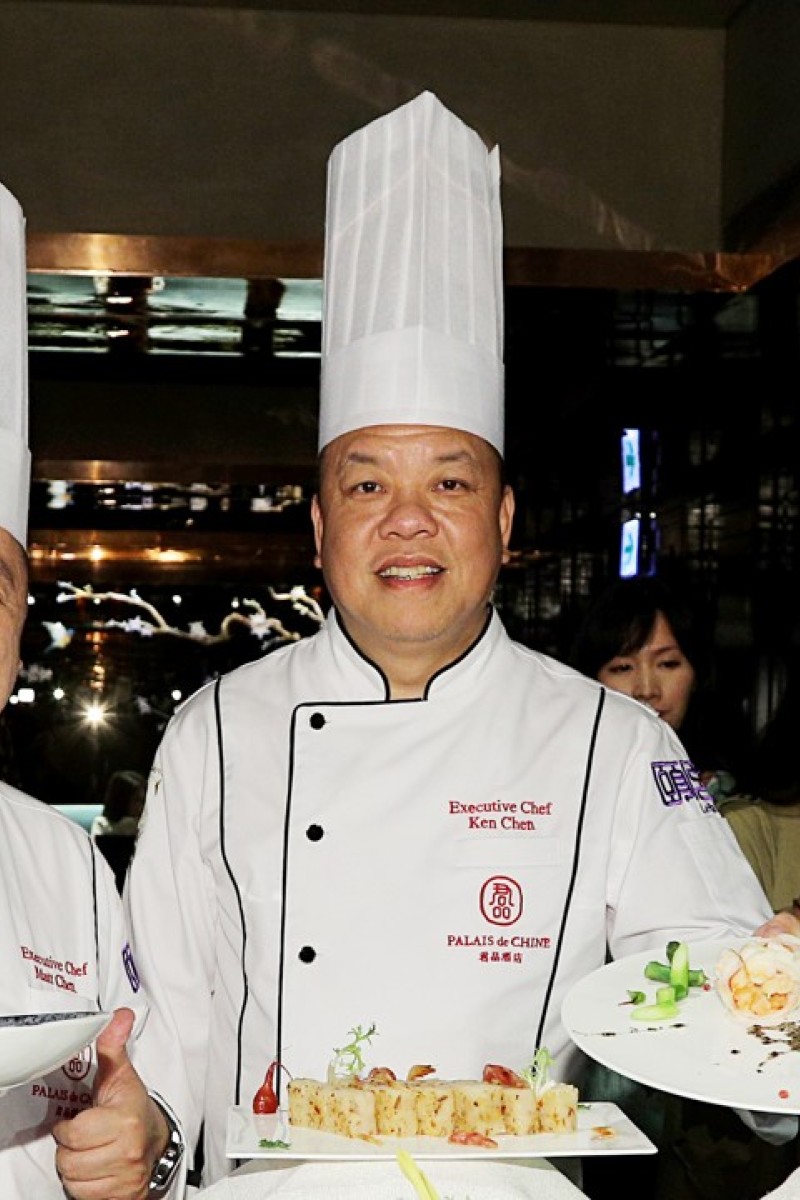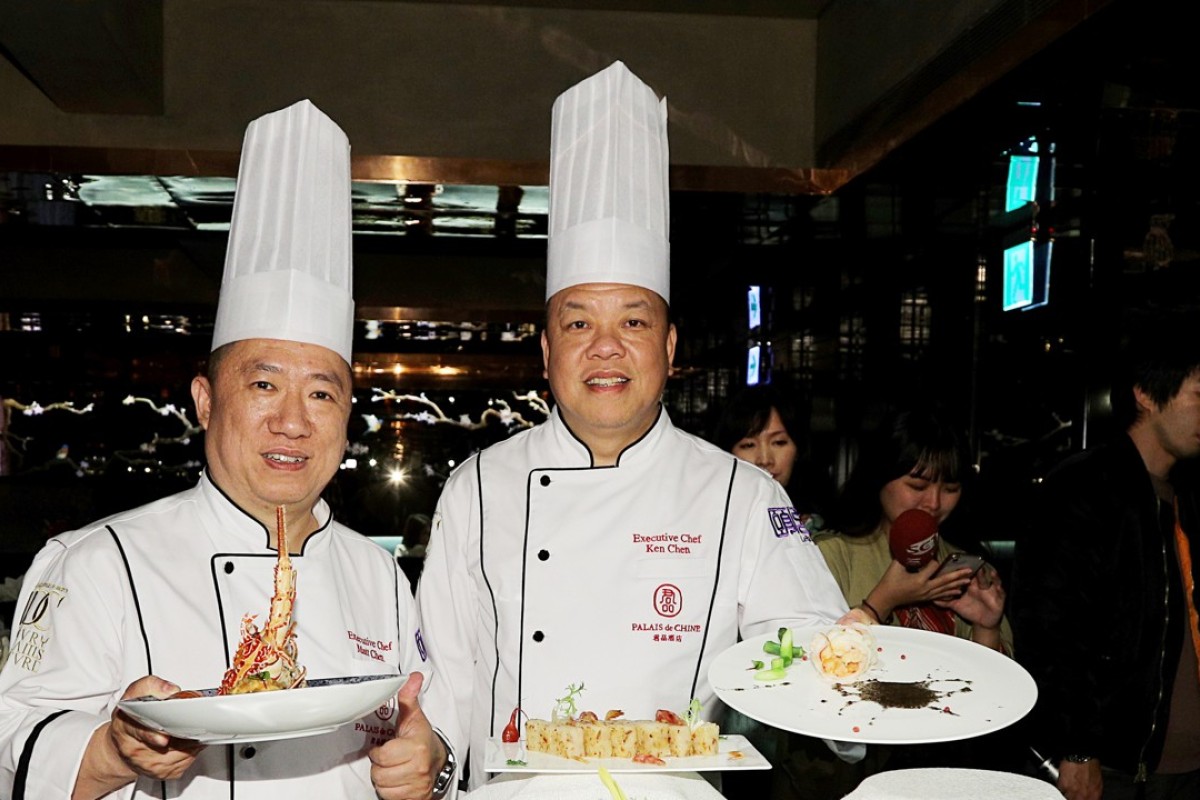
Hong Kong-born chef heads Le Palais, Taiwan’s only three Michelin star restaurant
Ken Chan left school at the age of 12 to push dim sum trolleys. Now, he is the top chef at Le Palais, a five-star hotel restaurant in Taipei.
 Ken Chan (right) is the top chef at Le Palais, Taiwan’s first ever three-starred Michelin restaurant.
Ken Chan (right) is the top chef at Le Palais, Taiwan’s first ever three-starred Michelin restaurant.Ken Chan has come a long way since he started out wheeling a trolley in a dim sum restaurant. He has become the first chef in his adopted home of Taiwan to win three Michelin stars.
Hong Kong-born Chan, 53, worked through tough apprenticeships back home before rising through the ranks on Taiwan’s culinary scene over the past three decades to become the top chef at Le Palais, a luxury five-star hotel restaurant, in Taipei.
Serving mainly Cantonese cuisine as well as Sichuan, Fuzhou, and Taiwanese dishes, Le Palais became the first and only restaurant in Taiwan to receive three stars when Michelin launched its Taipei guide earlier this year, describing the food as “truly outstanding”.
Follow the flavour: the Yuen Long noodle shop worth travelling for
Chan’s menu is relatively affordable compared with three-star restaurants in the rest of the world, with dishes ranging from steamed prawn dumplings and baked barbecue pork buns, priced from Tw$250 (HK$66), to an eight-course set including lobster salad, bird’s nest soup, braised abalone with goose foot and steamed tiger grouper at Tw$6,980.
Taiwan’s most-recognised chef, Andre Chiang, famously gave up the two Michelin stars attached to his eponymous Restaurant Andre in Singapore, closing it in February to focus on other projects, including his Taipei restaurant RAW.
But Chan said he believes receiving the stars will boost the island’s foodie credentials.
“It inspires everybody to aim higher and higher,” he said.
Chan attributed his award to luck, but it is also proof of his perseverance.
After dropping out of school in Hong Kong aged 12, Chan began working in a restaurant in the city, pushing a dim sum trolley around the tables.
He already had a love of cooking passed down from his mother and remembers how she would give him HK$2 to buy ingredients in the market to feed the family, as she was working full-time to make ends meet.
Having to carefully think how to spend the money to create the best meal has influenced his approach in the kitchen now, said Chan.
“I told my staff ‘You shouldn’t just aim to finish the job but should do it well, as if you were cooking for your parents,’” he said.
Life in the Hong Kong restaurant business was far from glamorous.
Chan was tasked with washing the underwear of a chef he worked under, and recalls being hit on the head with a spatula when his “master” was in a bad mood – even being thrown into a river for making mistakes.
“Back then if you wanted to learn something, you had to beg the master to teach you,” he said.
“I had to buy drinks and fruit to treat my masters so they would casually teach me one or two steps.”
Chan believes young people now are too pampered and unable to handle pressure.
“I have to ask them to learn,” he said.
With just HK$270 in his pocket, Chan began a new chapter in Taiwan 30 years ago at the age of 23, after his mother died and his girlfriend dumped him.
His first job was as a chef in a vegetarian restaurant and he recalls feeling isolated because he only spoke Cantonese, the dominant language in Hong Kong, not Mandarin which is spoken in Taiwan.
But he says a sense of pride made him stay and he began to build a reputation for his Cantonese cuisine.
Chan worked up to becoming head chef at another five-star hotel restaurant in Taipei, before taking the executive chef position at Le Palais in 2010.
At the time, the restaurant had only been open for a few months and Chan was discouraged over the lack of customers on his first day.
“I didn’t go home that night and locked myself in the office to ponder over how to run the restaurant,” he remembered. He came up with a new menu of 27 dishes, and replaced around a third of the staff as part of a major overhaul.
Chan is worried that traditional skills in Cantonese and Taiwanese cooking will eventually be lost as the old masters age and young chefs struggle to create the same flavours.
But for now, he said his own goal is to keep reinventing himself.
“I don’t see myself as a veteran chef,” he said.
“My mentality is that I am like a child just learning to walk, and I have to constantly learn new things.”
